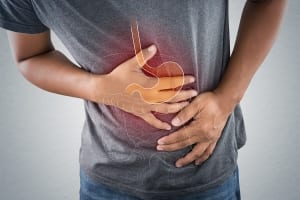Herzliya Medical Center
Tel: +972-9-959-4888
09:00-18:00
 Crohn’s disease is a chronic inflammatory disease that affects the digestive tract, mostly the small intestine, and the colon. It causes inflammation in the lining of the digestive tract, which causes abdominal pain, diarrhea, fatigue, weight loss, and malnutrition. Inflammation caused by Crohn’s disease can involve different areas of the digestive tract in different people. The treatment of Crohn’s disease in Israel is based primarily on medical therapy. The Department of Gastroenterology at Herzliya Medical Center uses non-steroidal and steroidal anti-inflammatory drugs and immune-system suppressors, antibiotics. If drug treatment does not lead to the desired result, surgery is conducted; a resection of a segment of the intestine.
Crohn’s disease is a chronic inflammatory disease that affects the digestive tract, mostly the small intestine, and the colon. It causes inflammation in the lining of the digestive tract, which causes abdominal pain, diarrhea, fatigue, weight loss, and malnutrition. Inflammation caused by Crohn’s disease can involve different areas of the digestive tract in different people. The treatment of Crohn’s disease in Israel is based primarily on medical therapy. The Department of Gastroenterology at Herzliya Medical Center uses non-steroidal and steroidal anti-inflammatory drugs and immune-system suppressors, antibiotics. If drug treatment does not lead to the desired result, surgery is conducted; a resection of a segment of the intestine.
Crohn’s disease is an inflammatory process that spreads over the entire thickness of the intestinal wall. Inflammation and ulceration may develop in any part of the digestive tract – from the mouth to the rectum, but often the pathological process is localized in the lower section of the fine and the upper segment of the colon.
Crohn’s disease is of a chronically intermittent nature: its recurrence alternates with remissions – completely asymptomatic periods. The treatment aims to achieve prolonged remission as radical means capable of permanently relieving the patient from the threat of relapse does not exist.
Clinical manifestations range from mild to very severe, requiring hospitalization in the Department of Gastroenterology.
Crohn’s disease increases the risk of cholecystitis, arthritis, inflammatory diseases of the eye (uveitis, conjunctivitis), specific skin lesions (erythema nodosum, arthritis), leads to a delay of puberty and physical development.
Recurrent inflammation accompanied by ulceration and scarring of the intestinal wall, resulting in the formation of a fistula (hole) or formed stricture – narrowing of the lumen of the intestine.
Other Developments:
In the Department of Gastroenterology at Herzliya Medical Center patients with suspected Crohn’s disease undergo a thorough investigation, which includes:
Treatment of Crohn’s disease begins with anti-inflammatory therapy.
Sulfasalazine. Used Primarily for recurrent inflammation in the colon
Mesalamine. Available in tablet form for oral administration, as well as rectal suppositories or enemas, which are used for inflammation of the rectum
Preparations based on corticosteroids are effective in reducing the inflammatory response, but their long-term use is accompanied by severe side effects: development of Cushing’s syndrome, hypertension, diabetes, osteoporosis, etc. For this reason, in the Department of Gastroenterology at HMC therapy steroids are appointed only for a limited period. It is used in patients with severe Crohn’s disease, with no response to other medicines.
A new group of steroidal anti-inflammatory drugs includes drug budesonide. A positive result in the treatment of Crohn’s disease with budesonide is observed significantly faster than with the traditional corticosteroids and fewer side effects develop.
Immune system suppressants are a group of drugs that artificially suppress the immune system, and reduce the severity of the inflammatory response. Immunosuppressive therapy can be combined with GCS: steroids to induce remission, and immunosuppressive drugs to enable it to consolidate in the long term.
With abundant diarrhea, the formation of fistulas and abscess, patients are prescribed antibiotic therapy.
Surgical treatment of Crohn’s disease is a partial bowel resection: the diseased segment is removed and the healthy parts are sewn together. Indications for surgery – the absence of the satisfactory effect of medical treatment or the development of complications. Surgery can also be performed at the strictures of the intestine to restore its patency. It must be emphasized that the resection of a segment of the intestine is not an ultimate mean of preventing relapse, and to reduce the risk of re-sharpening after surgery, the patient is prescribed an anti-inflammatory therapy.
The Department of Gastroenterology at Herzliya Medical Center specializes in the treatment of Crohn’s disease of any severity. Combination therapy with modern drugs allow a sustained remission and prevent the development of complications requiring surgical intervention.